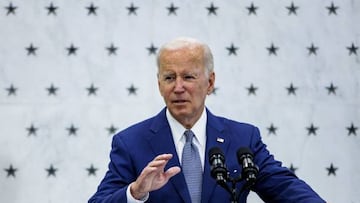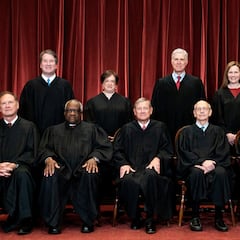What’s in U.S. President Joe Biden’s executive order on abortion rights?
Many polls show the public opposes the Supreme Court’s decision to overturn Roe. How will the President’s order protect access to reproductive healthcare?


The majority of voters do not approve of the US Supreme Court’s decision to overturn the landmark Roe v. Wade decision, which protected a constitutional right to abortion.
Various polls have found that anywhere between fifty-seven and sixty-four percent of adults oppose the decision, which could impact the way they vote this November.
A Pew Research poll found, overall, that fifty-seven percent of adults disapprove of the decision, with the only social and demographic groups in support being Protestants (52 percent) and white Evangelicals (71 percent). A majority of all other religious groups included in the survey opposed the decision, including Catholics and Evangelicals (non-white).
One of the greatest divides tracked was between white women and men, of which sixty-two percent of the former and forty-seven percent of the latter disapproved of the decision. White men were the only group racial and gender group to have a majority support the decision.
In response to the decision, President Biden has signed an executive order to bolster the protection of reproductive health services around the country. However, in many cases, these efforts will not be enough to counter state-level bans now active in several states.
What actions will be taken after the order?
Various government agencies and departments received mandates under the new exectuvtive order.
Today I signed an Executive Order to protect the reproductive rights of women in the aftermath of the Supreme Court's extreme decision to overturn Roe v. Wade.
— President Biden (@POTUS) July 8, 2022
It formalizes the actions I announced right after the decision and will add new measures to protect women's health. pic.twitter.com/cujWTnxKvw
Department of Health and Human Services
Within the thirty days, the Department of Health and Human Services (HSS) must identify all the ways within its power under which it is able to increase access to medical abortions. To limit the need for abortion services, HHS has also been mandated to increase access to family planning services and emergency contraceptives.
The agency is also tasked with ensuring that medical records and data are federally protected, and the confidentiality of both patients and providers is bolstered.
HSS is also tasked with:
- Identifying ways to share information on " how to obtain free or reduced-cost reproductive healthcare services through Health Resources and Services Administration-Funded Health Centers, Title X clinics, and other providers.”
- Promoting awareness on how to access a “full range of contraceptive services
- Educating the public so that they are aware of their rights to “seeking or providing reproductive healthcare services.
HSS will also work with the Department of Justice to increase public awareness on the best ways “to protect their health privacy and limit the collection and sharing of their sensitive health-related information.” This public service campaign may speak to the dangers of mobile application data, like period trackers, that could be subpoenaed or purchased by the state as they investigate patients and providers.
Department of Justice and Department of Homeland Security
Related stories
The President also committed to hosting a meeting with legal professionals, including private attorneys and legal aid organizations, to encourage them to take on pro bono clients who are impacted by state-level abortion bans. This meeting will be held with support from Attorney General Merrick Garland.
The next mandate for both of the departments will be to ensure that the safety of clinics and facilities that offer reproductive healthcare are protected in cases where there are “heightened” security concerns.

